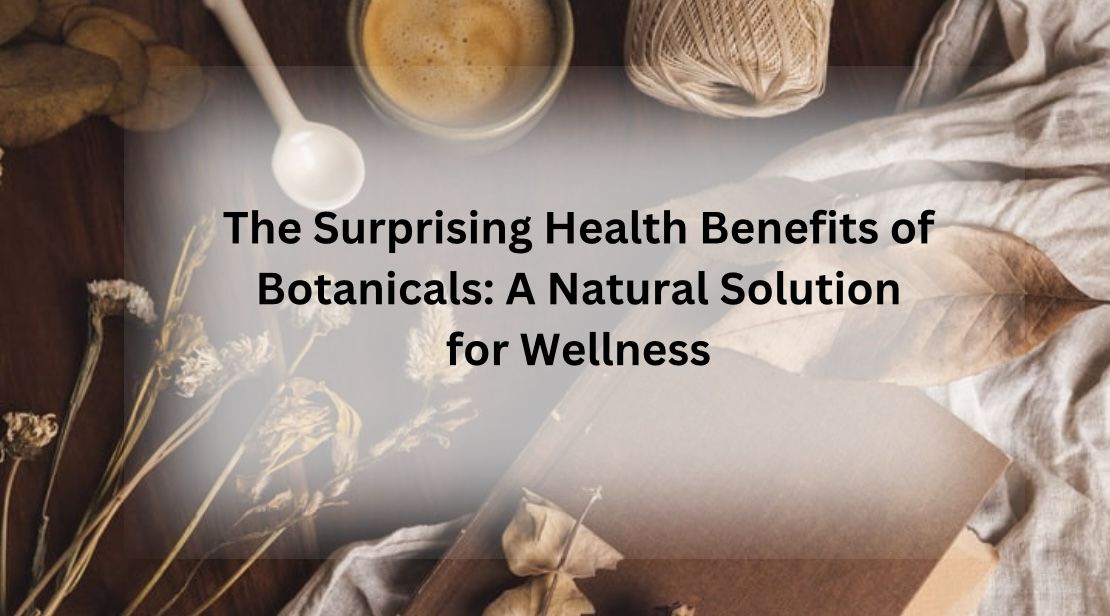Health Benefits of Botanicals

Health Benefits of Botanicals: A Natural Solution for Wellness
Health Benefits of Botanicals – In the journey for optimal health and wellness, the spotlight has increasingly turned towards natural cures and botanicals.
These gifts from nature, often ignored in present-day medication, offer a treasure stash of health benefits that can supplement and try and surpass conventional treatments. From easing pressure and anxiety to enhancing physical vitality, botanicals have become a promising avenue for comprehensive wellness.
In this exploration, we divulge the surprising health benefits of botanicals and dig into the best way to use kratom, a standout among these natural marvels.
The Ascent of Botanical Medication
From the beginning of time, societies worldwide have adored plants for their medicinal properties. Ancient civilizations depended on botanical solutions to heal ailments and advance vitality. As of late, the resurgence of interest in botanical medication mirrors a developing awareness of the limitations and secondary effects associated with synthetic drugs.

Botanicals offer a comprehensive approach to wellness, addressing the underlying drivers of health imbalances rather than only alleviating symptoms.
Wealthy in bioactive mixtures, these natural substances apply multifaceted impacts on the body, supporting various physiological capabilities.
Botanicals, also known as plant-derived substances, have been utilized for centuries for their potential health benefits.
These plant compounds are found in a variety of herbs, spices, fruits, vegetables, and other plant-based sources. While individual responses to botanicals can vary, and scientific research is ongoing, several plants are recognized for their potential health-promoting properties. Here are some insights into the health benefits of botanicals:
- Antioxidant Properties: Many botanicals are rich in antioxidants, which help combat oxidative stress and free radical damage in the body. Antioxidants play a crucial role in reducing the risk of chronic diseases and supporting overall health.
- Anti-Inflammatory Effects: Some botanicals possess anti-inflammatory properties that may help alleviate inflammation in the body. Chronic inflammation is linked to various health issues, including cardiovascular disease, arthritis, and neurodegenerative disorders.
- Immune System Support: Certain botanicals have been studied for their potential to enhance the immune system. They may help modulate immune responses, contributing to better defense against infections and illnesses.
- Cardiovascular Health: Several botanicals, such as garlic, hawthorn, and green tea, have been associated with cardiovascular benefits. They may help lower blood pressure, improve cholesterol levels, and support overall heart health.
- Cognitive Function: Certain botanicals, such as ginkgo biloba and turmeric, have been studied for their potential cognitive-enhancing effects. They may support brain function and memory, potentially reducing the risk of age-related cognitive decline.
- Digestive Health: Many herbs and spices are known for their digestive benefits. Peppermint, ginger, and fennel, for example, may help alleviate symptoms of indigestion, bloating, and nausea.
- Adaptogenic Properties: Adaptogens are a category of botanicals that may help the body adapt to stress and promote balance. Examples include ashwagandha, rhodiola, and holy basil. These herbs are thought to support the body’s resilience to stressors.
- Anti-Microbial Properties: Some botanicals exhibit antimicrobial properties, which can help combat bacteria, viruses, and fungi. Garlic, oregano, and tea tree oil are examples of botanicals with potential antimicrobial effects.
- Joint and Bone Health: Certain botanicals, like turmeric and boswellia, are studied for their anti-inflammatory effects, which may benefit individuals with conditions like arthritis and promote joint health.
- Skin Health: Botanicals such as aloe vera, chamomile, and calendula are often used for their soothing and healing properties on the skin. They may help with conditions like burns, cuts, and skin irritations.
It’s essential to note that while these insights suggest potential health benefits, individual responses can vary, and more research is needed to fully understand the mechanisms and effectiveness of botanicals in various health contexts. Before incorporating botanical supplements into your routine, it’s advisable to consult with a healthcare professional, especially if you have pre-existing health conditions or are taking medications.
SEE ALSO: CHRONIC FATIGUE SYNDROME
Uncovering the Health Benefits
Stress Alleviation and Mood Enhancement
Botanicals, for example, ashwagandha, passionflower, and chamomile have adaptogenic properties, assisting the body with adapting to pressure and restoring balance. By modulating cortisol levels and advancing relaxation, these spices offer a natural antidote to the tensions of current life. Incorporating them into daily schedules can improve a calm feeling and enhance overall temperament.
Resistant Help
Echinacea, elderberry, and garlic are among the botanicals eminent for their insusceptible supporting properties. Packed with antioxidants, vitamins, and other safe modulating compounds, these spices fortify the body’s natural guards, lessening the gamble of diseases and supporting powerful insusceptible capability.
Stomach-related Health
Ginger, peppermint, and licorice pull are celebrated for their stomach-related benefits. Whether calming a resentful stomach, alleviating acid reflux, or advancing healthy stomach flora, these botanicals offer delicate yet successful help for stomach-related wellness. I was incorporating them into meals or consuming them as herbal teas can aid in maintaining stomach-related harmony.
Pain Management
Turmeric, boswellia, and white willow bark are valued for their analgesic and anti-inflammatory properties. These botanicals offer natural alternatives to conventional pain medications, alleviating discomfort associated with arthritis, migraines, and muscle irritation. Their ability to target inflammation without the symptoms of traditional painkillers makes them invaluable allies in managing ongoing pain.
Discovering the Potential of Kratom
Among the different array of botanicals, kratom stands out for its extraordinary properties and versatile applications. Gotten from the leaves of the Mitragyna speciosa tree native to Southeast Asia, kratom has garnered attention for its potential as a natural solution for various health concerns.
The Best Way to Use Kratom
With regards to harnessing the benefits of kratom, the critical lies in dependable and informed usage. Here are a few rules for maximizing its therapeutic potential:
- Selecting Top notch Kratom
Pick reputable providers that offer unadulterated and lab-tried kratom items. Quality assurance guarantees that you’re getting a safe and robust botanical extract.
- Choosing the Right Strain
Kratom comes in various strains, each with its one-of-a-kind impacts. Whether looking for relaxation, a jolt of energy, or pain help, select the strain that aligns with your wellness goals.
3. Start Low, Go Slow
Start with a low portion of kratom to gauge your body’s reaction and gradually increase as required. This approach limits the gamble of adverse impacts and allows for personalized dosing.
- Rotate Strains
To forestall tolerance development and maintain viability, rotate between various kratom strains periodically. This practice also gives different bioactive mixtures for exhaustive wellness support.
- Stay Hydrated
Kratom can have gentle dehydrating impacts, so drinking a lot of water while utilizing it is essential. Appropriate hydration upholds optimal physical processes and mitigates potential secondary effects.
- Listen to Your Body
Pay attention to how your body reacts to kratom and adjust your usage accordingly. Everybody’s physiology is unique, so finding the correct dosage and recurrence may require experimentation and careful observation.
Conclusion
In a world inundated with pharmaceutical solutions, botanical medication offers a reviving alternative established in nature’s insight.
From alleviating pressure and enhancing mindset to supporting resistant capability and pain management, botanicals encompass various health-advancing properties. Among these natural treasures, kratom sparkles as a versatile botanical with the potential to address multiple wellness concerns.
By embracing botanicals as integral parts of our health regimens, we can embark on an excursion towards all-encompassing prosperity, reconnecting with the healing force of nature that has sustained humanity for millennia.
With capable usage and informed decisions, we can open the maximum capacity of botanicals and experience their transformative consequences for the brain, body, and soul.

















